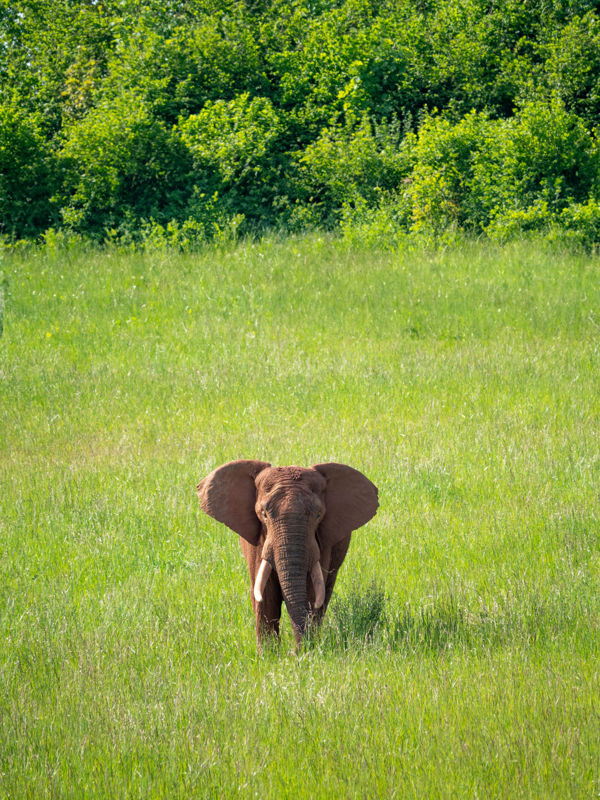Rare Andean bear twins born at Noah’s Ark Zoo Farm in Somerset
23rd Mar 2022
We are delighted to announce the birth of twin Andean bears. We have released CCTV footage from the near dark cubbing den showing the tiny bear cubs being cuddled by their mother, Madidi.
The bear cubs were born on 11th January to first time mum, Madidi. Cubs are born blind and helpless, weighing around 300 grams and roughly the size of a guinea pig. The keepers have been monitoring mum and cubs closely and are encouraged by how well they are all doing. The cubs have now both opened their eyes and have doubled in size over the past two months.
“We are thrilled by the birth of the bear cubs” said Lead Keeper Jayne Gibbins “We could hear the distinctive sound of the bear cubs trilling and chittering before we could see them. The cubs are born so tiny and as soon as they were born Madidi scooped them up in her arms.”
The Andean bear facility at Noah’s Ark is state of the art and has a specially designed cubbing den with 24-hour infra-red CCTV which captures video footage and is also fitted with sensitive microphones to be able to capture sounds in the den.
The keepers were able to monitor Madidi’s progress using the CCTV and maintain a hands-off approach, which is very important for these secretive bears. Keepers did not enter the bear house for the first week after birth; to give them as much privacy as possible in those first critical days. Keepers have been able to continue to provide excellent standards of care to Rasu, the cubs’ father using specially designed access points. Over the next few months, keepers will be able to keep their distance and monitor the development of the cubs closely via CCTV.
The adorable cubs are a significant birth for the European Endangered Species Program (EEP). In 2019, Madidi and Rasu were specially selected by the EEP to form a breeding pair. The bears instantly connected and now their pairing has become a tale of success for the programme.
“These bear cubs are very special not only for all of us here at Noah’s Ark but because they are important additions to the international efforts working to preserve the species and helping protect the long-term future of Andean bears.” said Chris Wilkinson, Curator of the zoo.
Keepers monitor the bears’ behaviour daily and became hopeful that Madidi may have been pregnant when she started choosing to spend more time apart from Rasu last October. Andean bears are largely solitary in the wild and the male has no participation in the rearing of the cubs. Keepers separated the bears and gave Madidi access to the cubbing den where she began building herself a nest from recycled shredded paper.
The team were able to monitor the intense nesting behaviour in late December and early January with no interference allowing Madidi’s natural, maternal instincts to take its course, leading to the successful birth of the cubs.
Andean bears are known for being shy in the wild. When pregnant, female bears build nests in secluded caves and sheltered spots to provide a safe place to rear their cubs. For this reason, very little has been observed of the breeding in the wild, so the CCTV footage from Noah’s Ark provides a rare insight into the bears’ nesting behaviour.
Andean bears are also referred to as spectacled bears due to their distinctive facial markings that can often give them the look of spectacles on their face. They are also famously the inspiration behind Paddington Bear from “darkest Peru.” However, these bear cubs won’t be eating marmalade sandwiches any time soon and will be sticking close to Madidi in the den for the next few months. As the cub will not be visible for a while, guests are encouraged to keep an eye on updates on the zoo’s website and social media, however Rasu can still be spotted within the main enclosure.
When Madidi feels ready, she will lead them out from the seclusion of her cubbing den into a special field set aside for them to explore the outdoors. It is at this next stage that it will become possible to do a health check-up and to find out the gender of the cubs.
Andean bears are the only species of bear to inhabit South America where they are found across Peru, Bolivia and Ecuador and in Colombia and Venezuela. Conservationists believe that there are fewer than 10,000 in the wild. They are listed by the International Union for the Conservation of Nature (IUCN) as vulnerable to extinction

Sign Up to the newsletter
Would you like to receive marketing emails from us? Please tick the box if you would like to receive information about future events, ways you can support our charity, offers and discounts.

